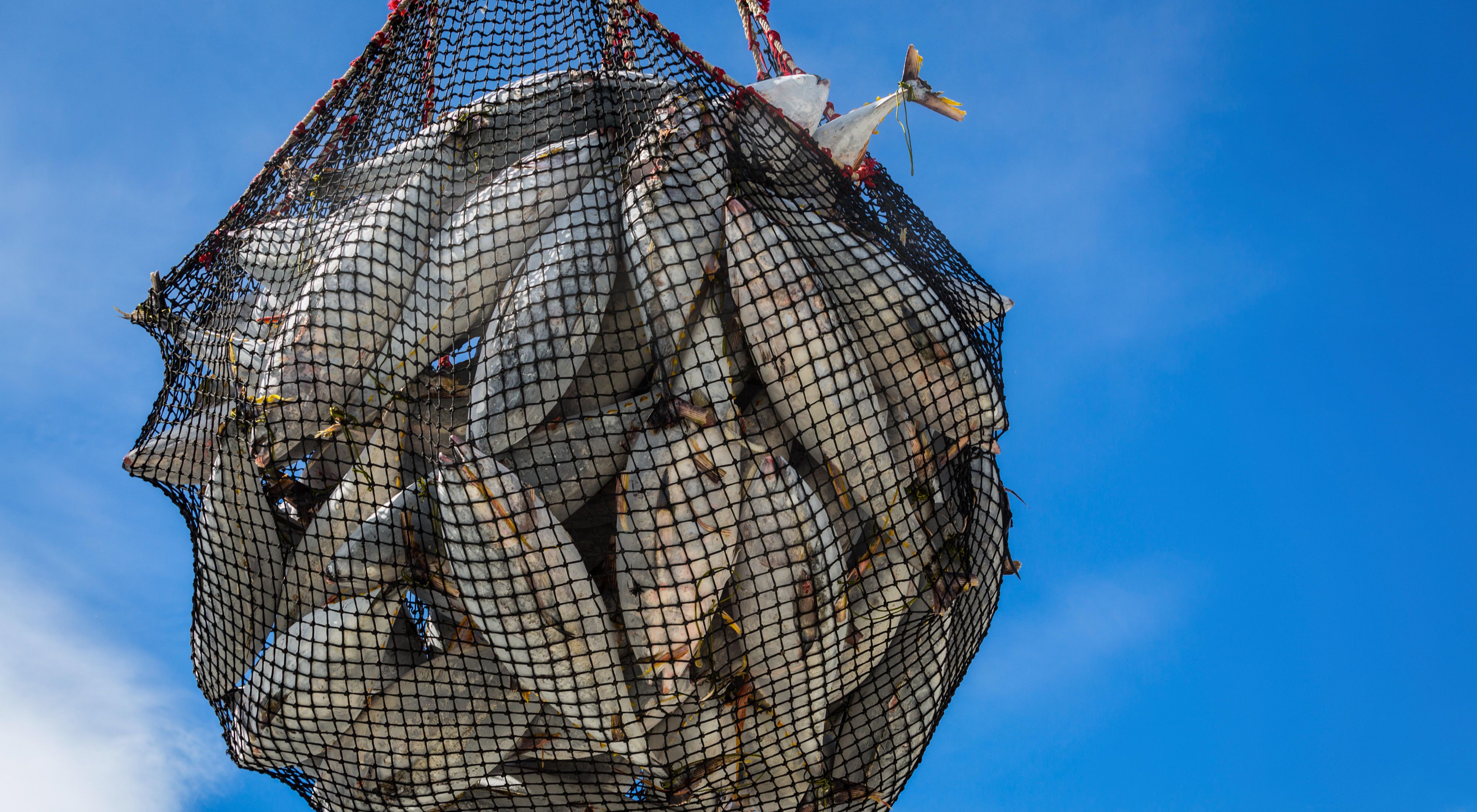All Eyes on Deck: The Republic of Ghana Commits to 100% Transparency on Industrial Fishing Vessels
Taking the lead in fisheries transparency in West Africa, the Republic of Ghana is committed to ensuring 100 percent electronic monitoring.
Media Contacts
-
Alessandra Clark
Global Media Relations Manager
The Nature Conservancy
Email: alessandra.clark@tnc.org -
Kwesi Ambo-Himbson
Chief Director
The Republic of Ghana, Ministry of Fisheries and Aquaculture Development
Email: kwesi.himbson@mofad.gov.gh
In a first for West Africa, The Republic of Ghana today announced its commitment to achieving 100 percent transparency in industrial fisheries operating within the exclusive economic zone by 2025. This goal will be reached through video cameras, remote sensors, Global Positioning Systems (GPS), and hard drives installed on fishing boats, jointly known as Electronic Monitoring Systems (EMS), to monitor fishing activities and collect valuable data like fishing effort, catch composition, bycatch, and human welfare.
These electronic systems provide additional information to improve oversight of fishing activity and will be used by fisheries managers and the private sector to understand what species are caught, where, and how much. This information is essential for the Government of Ghana and the supply chains for fish caught in Ghana to ensure transparent reporting of compliance and legality, and for better management of marine resources.
Speaking today at the Our Ocean 2023 conference in Panama City, the Honorable Mrs. Mavis Hawa Koomson, Minister of Fisheries and Aquaculture Development for the Republic of Ghana, said, “As the first West African nation to commit to 100 percent monitoring of all industrial fishing vessels, my administration is taking a bold position to improve the transparency of fishing activity. This will contribute to our aim to prevent, deter and eliminate illegal, unreported, and unregulated fishing in Ghana. This will support our continuing efforts to provide a stable source of employment and livelihood to millions of Ghanaians who rely on our fisheries for domestic and international markets – for this to be sustained we must manage resources responsibly and stop overfishing. Our hope is that this commitment will chart a new course towards better management in Ghana and inspire our neighboring African fishing nations to make transformative commitments as well.”
The announcement comes at a critical time for the country’s fisheries. The Republic of Ghana received a second yellow card warning in 2021 from the European Commission due to lapses in the management of Ghanaian fisheries. This commitment to 100 percent electronic monitoring demonstrates the Republic of Ghana’s commitment towards a more sustainable seafood industry.
By increasing transparency over the operations of the industrial fishing sector through the deployment of EMS, Ghana can address one of the major drivers of overfishing, illegal catch, and transshipment at sea of small pelagic species by closely monitoring compliance of these vessels with the nation’s rules and regulations. The EMS will also reduce labor abuses onboard the vessels and provide vessel owners and seafood processors with valuable on-board operational data that can inform business operations and drive continual on-the-water improvements.
Thai Union, one of the world’s leading seafood producers, with processing operations in Ghana, has previously committed to 100 percent ‘on-the-water’ monitoring of its international tuna supply chain by 2025. “Thai Union fully supports the Minister’s leadership in fisheries transparency and dedication to turning commitment into action. We fully support this commitment and have already been working on this in collaboration with the fishing vessels that we source from in Ghana,” said Tony Lazazzara, Group Director of Global Fish Procurement at Thai Union.
International conservation organization The Nature Conservancy (TNC), which has been supporting companies and governments around the world with EM, applauds The Republic of Ghana’s commitment. “Simply put, you can’t manage what you can’t measure— and many countries are still effectively ‘flying blind’ when it comes to fisheries management,” said Mark Zimring, TNC’s Large Scale Fisheries Director. “Electronic monitoring creates the transparency that is key to both fisheries managers and consumers having confidence that their seafood has been harvested legally, sustainably, and without labor abuses.”
The Ministry of Fisheries and Aquaculture Development (MOFAD) anticipates working with industry partners to trial EMS on industrial trawl vessels in 2023 through the Feed the Future Ghana Fisheries Recovery Activity, a project funded by the United States Agency for International Development (USAID) and supported by the international conservation organization The Nature Conservancy (TNC). Using the results from the trials, MOFAD will scale up EMS to all licensed industrial vessels operating in Ghana’s waters by 2025.
Through this commitment, The Republic of Ghana hopes to send a powerful signal, not just to neighboring African nations, but to markets across the world that a commitment to full fisheries transparency is the best way forward for businesses, for people, and for the future of the oceans we all depend on.
The Nature Conservancy is a global conservation organization dedicated to conserving the lands and waters on which all life depends. Guided by science, we create innovative, on-the-ground solutions to our world’s toughest challenges so that nature and people can thrive together. We are tackling climate change, conserving lands, waters and oceans at an unprecedented scale, providing food and water sustainably and helping make cities more sustainable. The Nature Conservancy is working to make a lasting difference around the world in 81 countries and territories (40 by direct conservation impact and 41 through partners) through a collaborative approach that engages local communities, governments, the private sector, and other partners. To learn more, visit nature.org or follow @nature_press on X.
